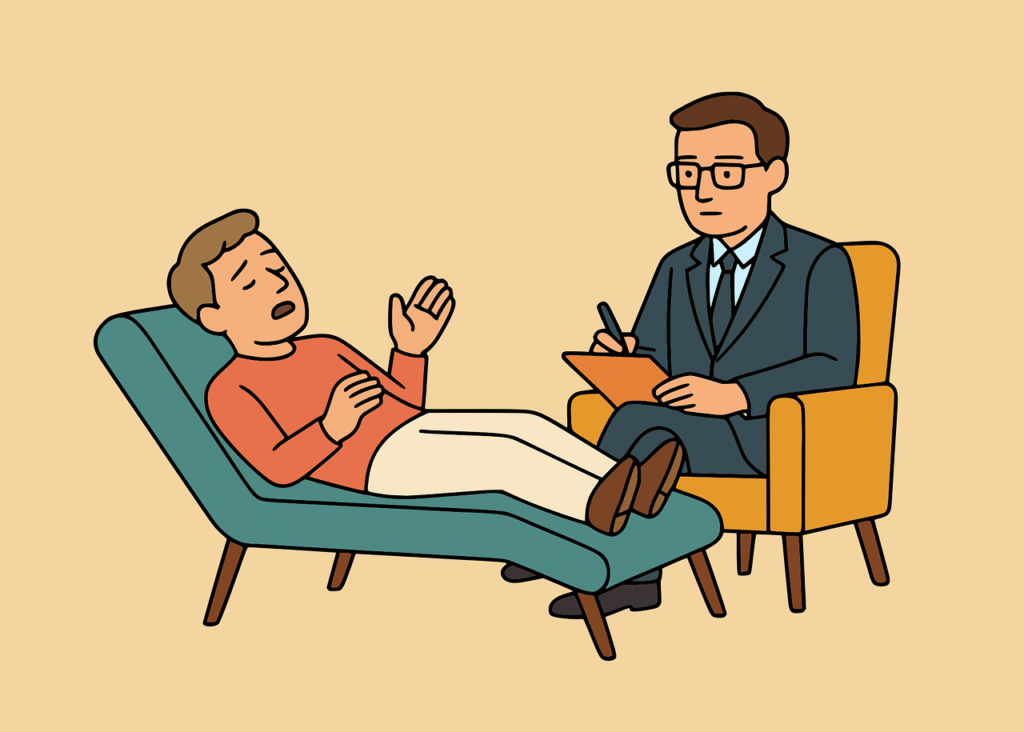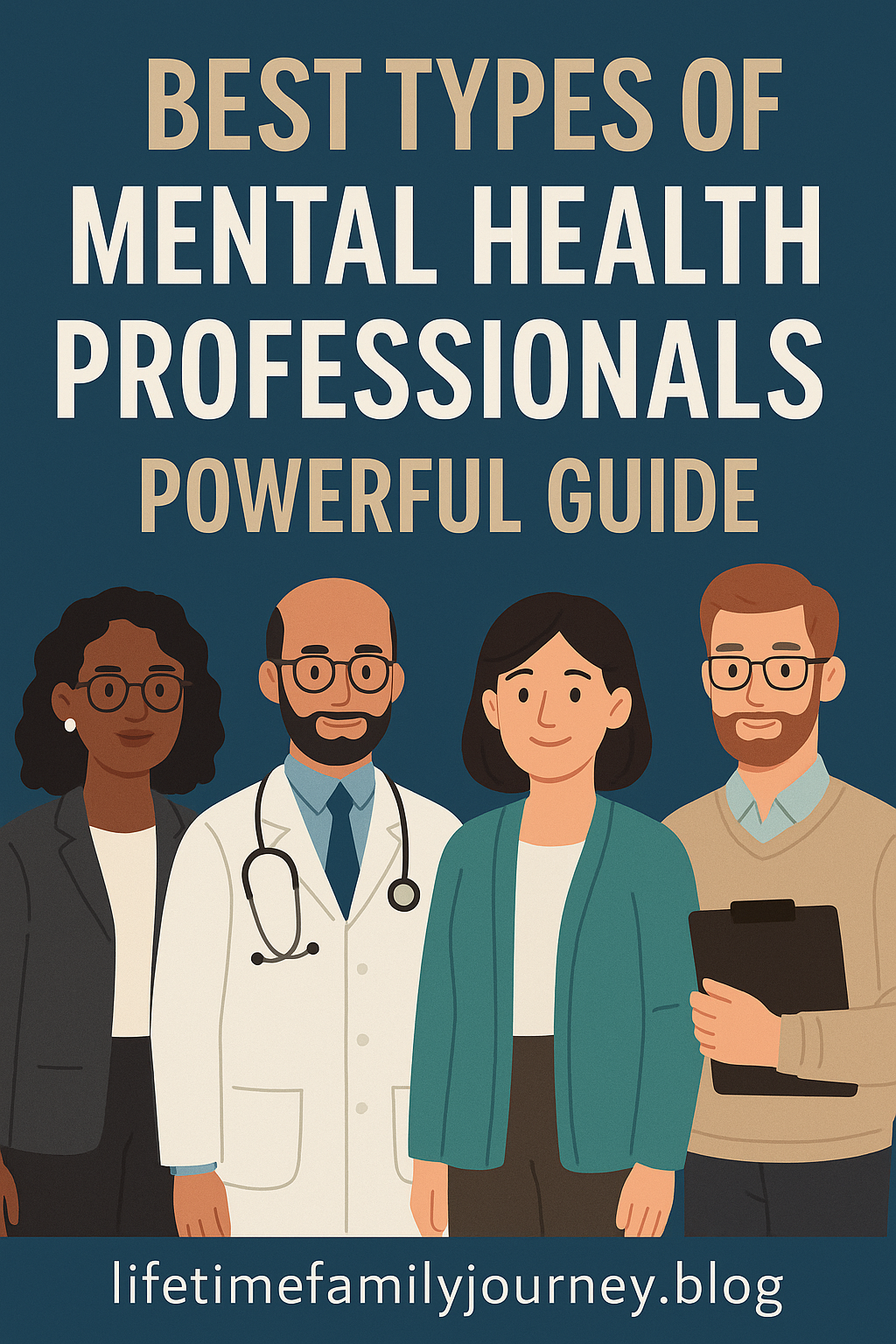Best Types of Mental Health Professionals: Powerful Guide

Picture this: You’re sitting in a waiting room holding an appointment card that says “Dr. Smith, LMFT” and you have no idea what those letters mean. Your teenager needs help, but you’re drowning in acronyms like LPC, LCSW, PhD, and PsyD. Sound familiar?
Trust me, as a dad of six kids ranging from 6 to 20 years old, I’ve been there. When one of my children needed support, I felt overwhelmed not just by the situation itself, but by the sheer confusion of figuring out who does what in the mental health world.
Here’s the thing: choosing the right mental health professional isn’t just about finding someone with a degree hanging on their wall. It’s about understanding what types of mental health professionals exist, what they actually do, and how to match their expertise with what your family needs.
Why Understanding Mental Health Provider Types Actually Matters
Let me share something that might surprise you. According to recent studies, nearly 40% of people who start therapy quit within the first few sessions—not because therapy doesn’t work, but because they ended up with the wrong type of provider for their needs.
Think about it this way: you wouldn’t take your car to a bike mechanic, right? The same logic applies when choosing a therapist or any mental health provider. A psychiatrist vs psychologist debate isn’t just academic—it could be the difference between getting the right help quickly or spending months (and lots of money) spinning your wheels.
When my wife (a middle school math teacher) and I first navigated how mental health is diagnosed for one of our kids, we learned this lesson the hard way. We started with the wrong type of professional and ended up delaying the help our child actually needed.
The reality? Finding mental health help becomes infinitely easier when you know what you’re looking for.
The Core Types of Mental Health Professionals Every Parent Should Know 🧠💡
Let’s break down the main players in the mental health field. I’ll give you the straight talk on who does what, when you need them, and what to expect.
🏥 Psychiatrist: The Medical Doctor of Mental Health
Psychiatrists are medical doctors who went to medical school, completed a residency, and specialized in mental health. Here’s what makes them unique:
➤ They can prescribe medication, order lab tests, and make medical diagnoses
➤ Perfect for complex conditions like bipolar disorder, schizophrenia, or severe depression
➤ Often focus more on medication management than ongoing therapy
➤ Typically more expensive and harder to get appointments with
When you need a psychiatrist: If there’s any question about whether medication might help, or if you’re dealing with serious mental health conditions that might have biological components.
| Pros ✅ | Cons ❌ |
|---|---|
| Can prescribe medication | Usually more expensive |
| Medical training for complex cases | Longer wait times |
| Can order medical tests | Less focus on ongoing therapy |
I remember when we suspected one of our kids might have ADHD. The psychiatrist was able to rule out other medical causes and, after proper evaluation, prescribed medication that made a dramatic difference. That’s something other types of mental health professionals simply can’t do.
For more on what psychiatrists treat and how medication fits into mental health care, visit the National Institute of Mental Health (NIMH)
🧠 Psychologist: The Assessment and Therapy Specialist
Psychologists have doctoral degrees (PhD or PsyD) and are the testing experts of the mental health world:
▪️ Specializing in psychological testing, assessments, and various therapy approaches
▪️ Cannot prescribe medication in most states (though this is slowly changing)
▪️ Excellent for complex diagnoses, learning disabilities, and specialized therapy techniques
▪️ Often more expensive than counselors but less than psychiatrists
The American Psychological Association (APA) offers a clear explanation of what psychologists do and how their role differs from other professionals.
When you need a psychologist: If you need comprehensive testing (like for ADHD, autism, or learning disabilities) or if you want someone with extensive training in specific therapy approaches.
🤝 Licensed Professional Counselor (LPC): The Accessible Therapy Option
LPCs have master’s degrees and represent the majority of practicing therapists. They’re often your best starting point:
🔹 Broad training in various therapy approaches and mental health conditions
🔹 More accessible and affordable than psychologists or psychiatrists
🔹 Can handle most common issues: anxiety, depression, family conflicts, grief
🔹 Usually easier to get appointments with
For details on counselor credentialing and national certification standards, check the National Board for Certified Counselors (NBCC).
When you need an LPC: For most common mental health concerns, family therapy, or when you want to start with a more affordable option while figuring out exactly what you need.
🌐 Clinical Social Worker (LCSW): The Holistic Helper
LCSWs also have master’s degrees but bring a unique perspective to mental health care:
→ Focus on how social, economic, and environmental factors affect mental health
→ Excellent at connecting families to community resources
→ Strong advocates for clients navigating systems (schools, insurance, government services)
→ Often work in hospitals, community centers, and family service agencies
When you need an LCSW: If your mental health concerns are connected to broader life circumstances, if you need help navigating systems, or if you want someone who looks at the whole picture of your family’s situation.
💊 Psychiatric Nurse Practitioner (PMHNP): The Rising Star
PMHNPs are advanced practice nurses with specialized mental health training:
★ Can prescribe medication and provide therapy
★ Often more accessible than psychiatrists
★ Typically take a more holistic, patient-centered approach
★ Growing rapidly in availability across the country
When you need a PMHNP: When you need someone who can prescribe medication but want more accessibility than traditional psychiatrists offer, or when you prefer a nursing-focused approach to care.
Specializations That Can Make or Break Your Success 🎯
Understanding types of mental health professionals is just the first step. Within each category, providers often specialize in specific approaches or populations. Here are some key specializations to know about:
🧘♀️ Trauma-Informed Therapy: Essential if you’re dealing with PTSD, childhood trauma, or any situation where someone has experienced significant harm. Techniques like EMDR (Eye Movement Desensitization and Reprocessing) can be life-changing for trauma survivors.
🧠 Cognitive Behavioral Therapy (CBT): Great for anxiety, depression, and changing negative thought patterns. It’s practical, structured, and usually time-limited.
💭 Dialectical Behavior Therapy (DBT): Originally developed for borderline personality disorder, but excellent for anyone struggling with intense emotions or self-harm behaviors.
👨👩👧👦 Family Systems Therapy: Perfect when the issues affect the whole family or when family dynamics are part of the problem.
🎨 Play Therapy: Essential for younger children who can’t yet articulate their feelings verbally.
As one parent blogger at MomBlogSociety puts it: “Understanding your situation is one step closer to getting better.” And part of understanding your situation is knowing which specialized approach might help most.
Critical Factors for Choosing a Therapist That Actually Work 🔍
After navigating this system with multiple kids, here are the factors that actually matter when choosing a therapist:
💰 Cost and Insurance Reality Check
Let’s be honest about money because mental health care is expensive:
◉ Insurance coverage: Not all providers accept all insurance plans
◉ Sliding scale fees: Many LPCs and LCSWs offer reduced rates based on income
◉ Telehealth options: Often more affordable and accessible than in-person care
◉ Employee assistance programs: Many employers offer free counseling sessions
💡 Pro Tip from Our Family's Experience:
Don't assume expensive equals better. Some of our best
therapeutic relationships have been with providers who
charged less than half of what the "premium" options cost.
⏰ Availability and Timing
The mental health provider shortage is real:
⚡ Wait times: Psychiatrists often have 2-3 month wait lists
⚡ Crisis situations: Know your local emergency mental health resources
⚡ Ongoing appointments: Make sure your provider can see you as often as needed
When you’re dealing with a mental health crisis, “the best therapist” is often “the one who can see you this week.”
🤲 Cultural and Personal Fit
This matters more than you might think:
🎯 Gender preferences: Especially important for teens and trauma survivors
🎯 Cultural understanding: Providers who understand your family’s background
🎯 Faith considerations: If religion is important to your family, consider faith-integrated approaches
🎯 Communication style: Some people need directive approaches, others prefer reflective listening
🎭 Therapy Style Matching
Different types of mental health professionals often use different approaches:
| Style | Best For | What to Expect |
|---|---|---|
| Directive/Structured | Quick results, specific goals | Clear homework, measurable progress |
| Reflective/Process | Deep insight, self-discovery | More talking, exploring feelings |
| Solution-Focused | Immediate problems | Practical strategies, short-term |
| Long-term/Psychodynamic | Pattern recognition | Exploration of history, relationships |
The blogger at Being Mamma Bear gives excellent real-world perspective on these practical considerations, emphasizing that the “perfect match” is often more important than the specific credentials.
Knowing When (and How) to Switch Mental Health Professionals 🚪
Here’s something nobody talks about enough: sometimes you need to change providers, and that’s completely normal.
⚠️ Warning Signs It’s Not Working
✗ You feel judged or dismissed during sessions ✗ No progress after 6-8 sessions (with some exceptions for complex trauma) ✗ Your provider seems unprepared or disorganized ✗ You don’t feel comfortable being honest with them ✗ They keep canceling or rescheduling appointments
🚩 Red Flags That Require Immediate Change
🛑 Any inappropriate behavior or boundary violations
🛑 Providers who seem to push their personal agenda
🛑 Anyone who makes you feel worse about yourself consistently
🛑 Professionals who refuse to coordinate care with other providers when needed
💬 How to Switch Gracefully
Here’s a script I’ve used: “I appreciate the work we’ve done together, but I think I need to try a different approach. Can you provide me with my records and any referral recommendations?”
Most ethical providers understand that fit matters and won’t take it personally. The blogger at Allie Kidd Blog emphasizes this point perfectly: “It’s normal to try, reassess, and try again until you find the right match.”
Understanding When You Need Medication vs. Therapy (or Both) 💊🗣️
One of the biggest questions families face is whether they need medication for mental health issues, therapy, or both. Here’s how to think about it:
🩺 Signs You Might Need Medication
📍 Symptoms are severe enough to interfere with daily functioning
📍 Previous therapy alone hasn’t provided sufficient relief
📍 Family history of mental health conditions that respond well to medication
📍 Conditions like bipolar disorder, schizophrenia, or severe depression
💭 When Therapy Alone Might Be Enough
📌 Situational stress or adjustment issues
📌 Relationship or family conflicts
📌 Mild to moderate anxiety or depression
📌 Behavioral issues in children
⚖️ The Power of Combination Treatment
🔬 Research Shows:
For many conditions, combining medication and therapy
produces the best outcomes. Don't feel like you have
to choose one or the other.
Understanding when you might need medication versus therapy (or both) is crucial for making informed decisions about your family’s mental health journey.
Putting It All Together: Your Decision-Making Checklist ✅
Before you start calling providers, ask yourself these questions:
🤔 Do I need someone who can prescribe medication?
| Answer | Best Option |
|---|---|
| Yes | Start with a psychiatrist or PMHNP |
| Maybe | Consider a psychologist or LPC who can refer if needed |
| No | LPC or LCSW are great options |
🧪 Do I need psychological testing?
➤ If yes: Psychologist is your best bet
➤ If unsure: Start with an initial consultation to determine
👪 Is this primarily a family issue?
◆ If yes: Look for family therapists (can be any credential with family training)
◆ Consider LCSWs who specialize in family systems
💳 What’s my budget and insurance situation?
💰 Budget Guide:
Higher budget ➜ Psychologist or psychiatrist
Moderate budget ➜ LPC or LCSW
Limited budget ➜ Community centers, sliding scale providers
⚡ How urgent is the situation?
🚨 Crisis: Emergency services or walk-in clinics
⏰ Urgent: PMHNP or LPC (typically more available)
📅 Non-urgent: You have more flexibility to find the right fit
🎨 What’s my preferred therapy style?
▸ Practical/structured: Look for CBT or solution-focused providers
▸ Exploratory/insight-focused: Psychodynamic or humanistic approaches
▸ Trauma-focused: EMDR, trauma-informed care specialists
Building Your Mental Health Support Team 🏗️

Here’s something I’ve learned from our family’s journey: you don’t always need just one provider. Sometimes the best approach is building a team:
🎯 Primary therapist: For ongoing emotional support and coping strategies
💊 Psychiatrist: For medication management if needed
🏫 School counselor: For educational accommodations and support
👩⚕️ Family doctor: For coordination of care and medical considerations
The key is making sure everyone communicates. Don’t be afraid to ask providers how they coordinate care with others on your team.
Special Considerations for Different Ages and Situations 👶👦👧🧓
🎈 Working with Children and Teens
◦ Play therapists for younger children (usually ages 3-12)
◦ Teen specialists who understand adolescent development
◦ School-based services that can coordinate with education plans
👨👩👧👦 Family Therapy Considerations
When the whole family is involved, look for providers trained in:
🔸 Family systems approaches
🔸 Multi-generational therapy
🔸 Communication skills training
For families like ours with multiple children, finding someone who can work with different age groups is invaluable.
🚨 Crisis and Emergency Situations
Know your resources before you need them:
| Emergency Type | Contact |
|---|---|
| Immediate safety concerns | 911 or emergency room |
| Suicide prevention | 988 (National Lifeline) |
| Crisis text support | Text HOME to 741741 |
| Local crisis intervention | Check your area’s services |
Making Your First Appointment: What to Expect 📅
Once you’ve chosen a provider, here’s what typically happens:
📋 Initial Consultation (Usually 60-90 minutes)
✓ Background and history gathering
✓ Symptom assessment
✓ Treatment planning discussion
✓ Questions about approach and expectations
🔄 Ongoing Sessions (Usually 45-50 minutes)
✓ Regular check-ins on progress
✓ Skill building and strategy development
✓ Processing experiences and emotions
✓ Adjusting treatment plan as needed
❓ Questions to Ask in Your First Session
➜ “What’s your experience with situations like ours?”
➜ “What treatment approach do you recommend and why?”
➜ “How do you measure progress?”
➜ “What should we do if this approach isn’t working?”
Getting started with therapy can feel overwhelming, but knowing what to expect makes the process much more manageable and less intimidating for your family.
The Reality of Finding Mental Health Help in Today’s World 🌍
Let me be completely honest with you: finding mental health help in 2025 is challenging. Provider shortages, insurance complications, and wait times can be frustrating. But don’t let that discourage you from starting the process.
💡 Practical Tips That Actually Work
🎯 Action Steps:
1. Start with your insurance company's provider directory
(but don't stop there - many aren't up-to-date)
2. Ask for referrals from trusted sources
3. Consider telehealth options
4. Don't rule out community mental health centers
5. Be persistent but patient
🤝 Ask for referrals from people you trust: Your family doctor, school counselors, other parents, or trusted friends often have better recommendations than online directories.
💻 Consider telehealth options, especially if you live in a rural area or have transportation challenges. Many excellent providers now offer online sessions.
🏥 Don’t rule out community mental health centers. While they might have longer wait times, they often have sliding scale fees and specialized programs.
⚡ Be persistent but patient. It might take several phone calls and some wait time, but the right provider is out there.
Red Flags to Avoid When Choosing Any Mental Health Professional 🚩
Regardless of which types of mental health professionals you’re considering, watch out for these warning signs:
❌ Providers who guarantee quick fixes or promise unrealistic outcomes
❌ Anyone who seems more interested in your insurance than your concerns
❌ Professionals who won’t coordinate with other providers when appropriate
❌ Anyone who makes you feel judged or uncomfortable being honest
❌ Providers who push services you haven’t asked for or don’t seem necessary
Trust your instincts. If something feels off, it probably is.
Moving Forward: Taking Action for Your Family 🚀
Understanding types of mental health professionals is just the beginning. The next step is taking action, and I know that can feel overwhelming.
Start small. Pick up the phone and make one call. Ask one question. Schedule one consultation.
Remember, seeking mental health support isn’t a sign of weakness—it’s a sign of wisdom. You’re modeling for your children that it’s okay to ask for help when you need it.
As I’ve learned through our family’s journey, including our experiences with breaking the stigma of mental health, the right professional can make all the difference. It might take time to find them, but when you do, the relief and progress that follow are worth every effort.
📝 Keep a journal of your progress with any provider you choose. Note what’s working, what isn’t, and how you’re feeling after sessions. This information is incredibly valuable for determining whether you’re with the right person or need to make a change.
Your Mental Health Journey Starts with Understanding 🌟

Finding mental health help doesn’t have to be a shot in the dark. When you understand the different types of mental health professionals, what each brings to the table, and how to match their skills with your family’s needs, you’re already ahead of the game.
Choosing a therapist or any mental health provider is ultimately about finding someone who understands your situation, respects your family’s values, and has the skills to help you reach your goals. Whether that’s a psychiatrist, psychologist, LPC, LCSW, or PMHNP depends on your unique circumstances.
The psychiatrist vs psychologist debate? The truth is, there’s no universal “best” choice. There’s only the best choice for your family, at this moment, for these specific needs.
Take that first step. Your family’s mental health journey is worth the effort, and understanding your options is the foundation for making confident decisions about your care.
Remember: getting help is a sign of strength, not weakness. And with the right types of mental health professionals in your corner, you’re setting your family up for lasting success and wellbeing. 💪✨
More from Our Family of Blogs:
Lifetime Family Journey – Stories, guides, and lessons from life in a big family.
Mountains Will Move – Faith, resilience, and encouragement for life’s hardest battles.
Everyday Exposed – Real talk on culture, media, and the world we’re raising our kids in.
